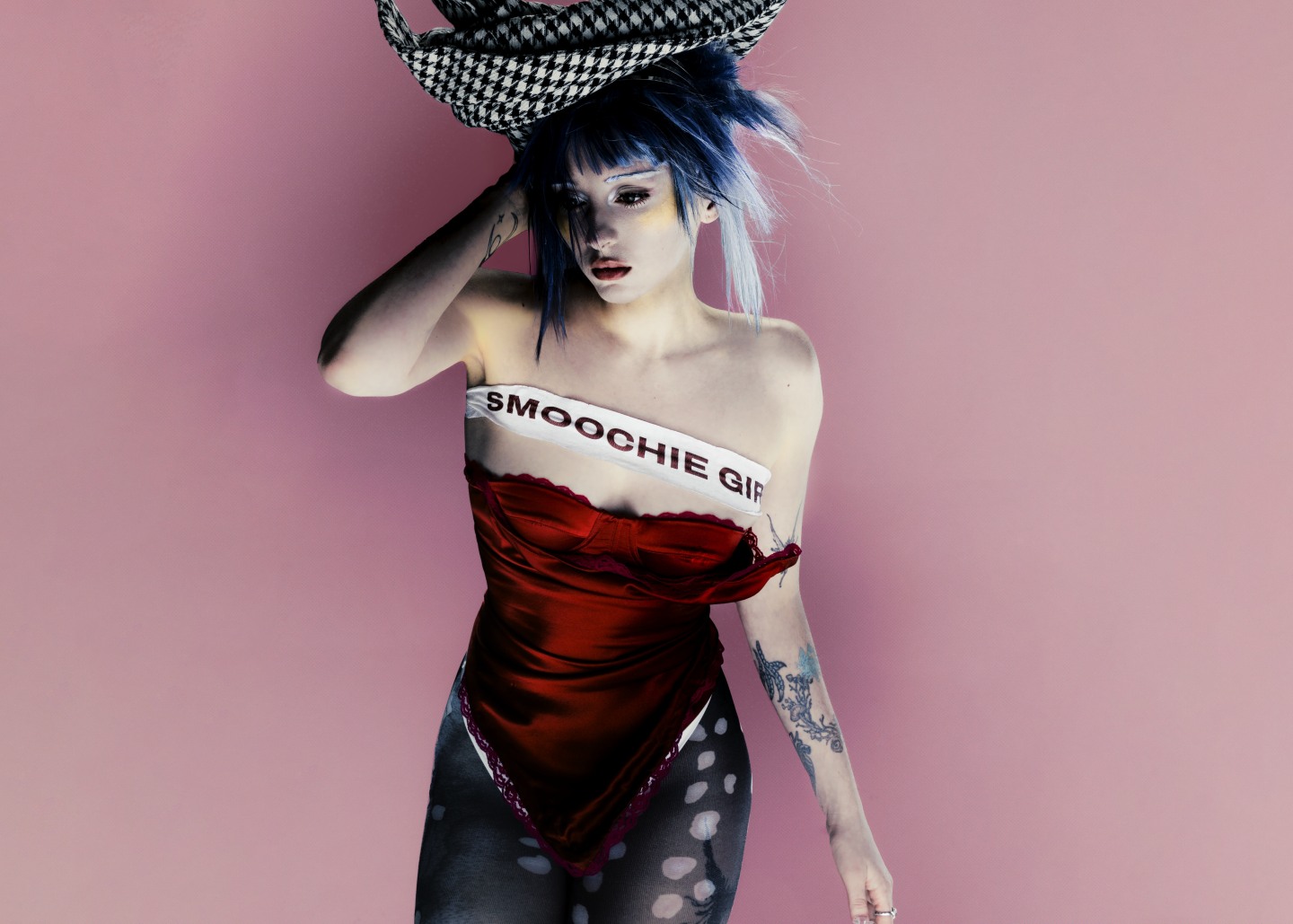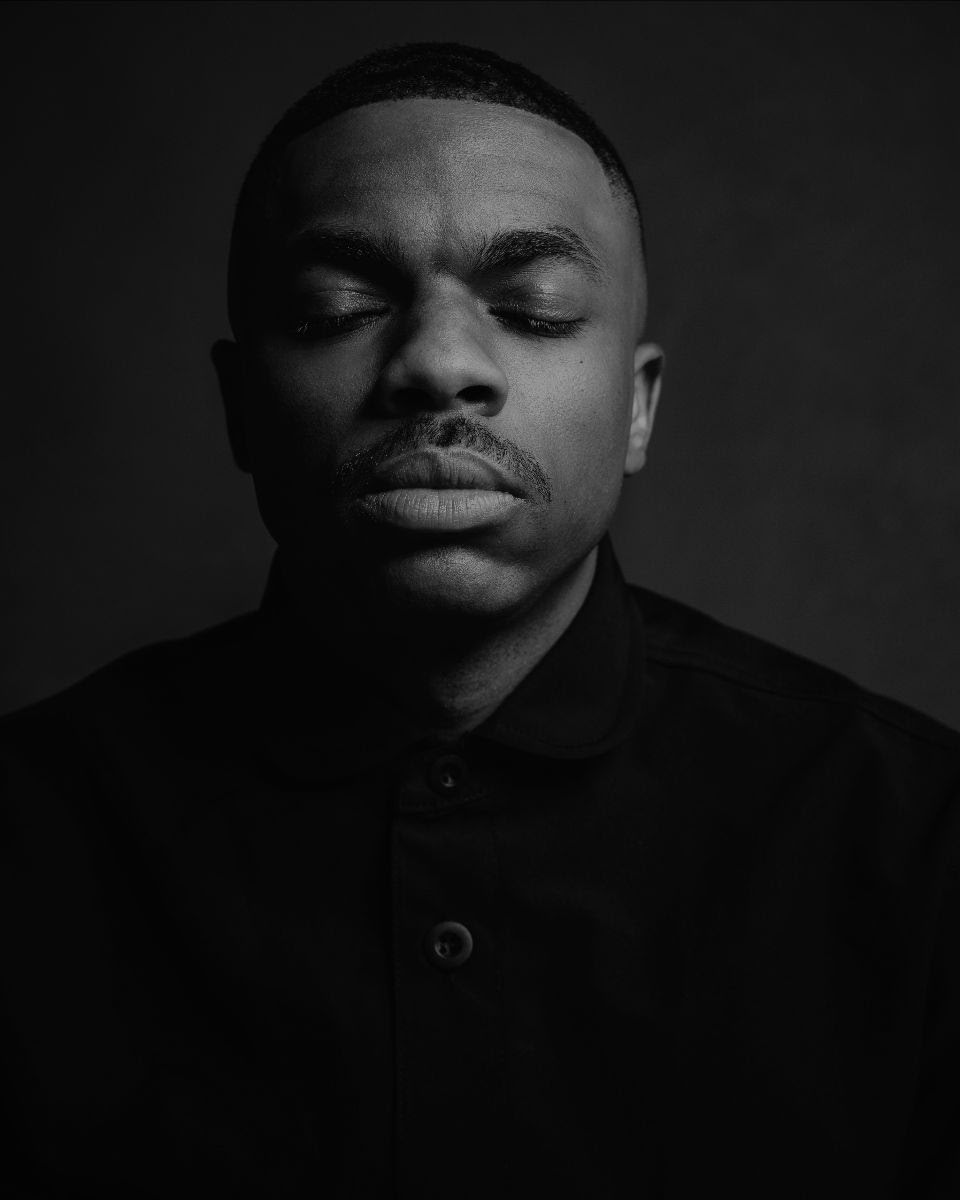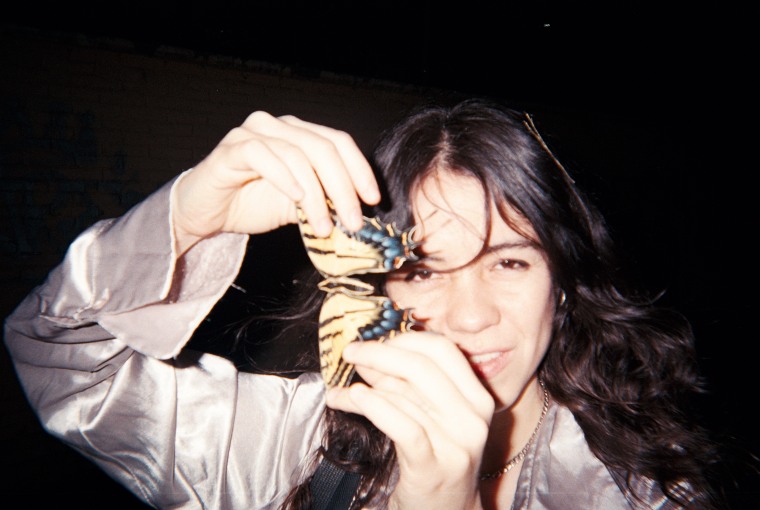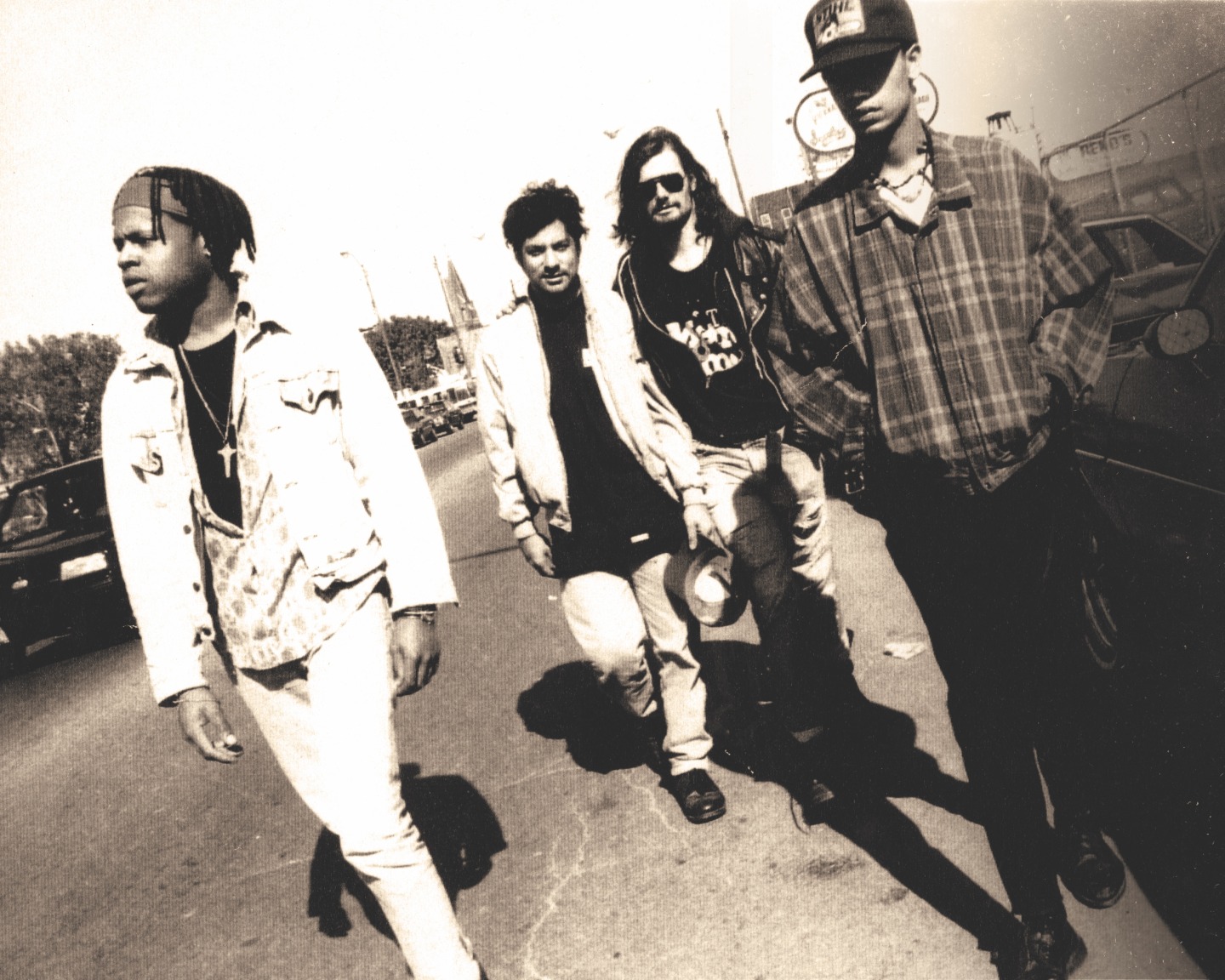Ashnikko. Photo by Vasso Vu.
“Do you have my baby teeth?” Ashnikko asks her mom. I can’t hear the response over the Zoom call, but it appears to be affirmative. “Okay, give them to me,” Ashnikko says firmly. “I need them.” The 29-year-old singer and rapper and her mom are walking to Pilates during our interview, over the course of which she dodges honking cars, almost gets hit by a bike, and talks to an eager fan (shoutout to Hector).
Chaotic? Sure. But you’d expect nothing less from her music. It’s been six years since the acerbic anti-toxicity rage-rap single “Stupid” became Ashnikko’s first viral track, five years since the hit “Daisy” swept across TikTok with its dark vocals and skittering trap, and two years since Ashnikko battled machines in her apocalyptic sophomore album, Weedkiller. Part cybergoth-sharp and fairy-soft, Ashnikko’s image is as distinct as her sound, a meld of crackly bass lines, pop earworms with stylized vocals, and incensed, punk-infused rap.
As the 29-year-old singer and rapper prepares to release her new album Smoochies on October 17, Ashnikko is ready to stop trying to be an “it girl” and return to making the music that’s just for her. And of course, keep up her baby teeth collection.
“I love to collect little found objects from the street and punch holes in them and tie them around my neck, and I love to attach things to my bag,” Ashnikko says. “I have a novelty condom tied to my bag right now. I’m also such a sucker for a little trinket box, like a little silver engraved trinket box with teeth in it. I really, really, want my best friend’s baby teeth.”
Smoochies has the same love-it-or-leave-it approach to Ashnikko’s music: These are songs that embrace her quirks and draw strength from them. There’s the brash “Full Frontal,” which distorts the rapper’s voice into something gritty and robotic; “It Girl,” a vulnerable ballad with a dramatic, sweeping bridge; and Ashnikko’s newest single, “Trinkets,” an ode to decorative baubles set to an impish, bouncing instrumental.
Before she began work on Smoochies, Ashnikko made sure she approached it from a “playful and joyful” perspective. “I was a bit fatigued by the songwriting process, and I wanted to tap back into the core reason why I do it and make the music that makes me feel just as euphoric as when I first started.” Over Zoom, we spoke about the upcoming album, the male gaze, and the death of the “it girl” construct.
The FADER: You said in a press release for “Itty Bitty” that bodies are like canvases and that “we arm ourselves with trinkets,” which was of course a nod to one of your new single, “Trinkets.” What are the objects that represent you and help you express yourself?
Ashnikko: Wanting to arm yourself with little treasures is a very important part of being human and it’s so cute. I feel like a little bird weaving silver thread into my nest when I make a little choker out of bottle caps. I’m also such a big advocate for making your own clothes and ripping them up and sewing them back together. Fuck fast fashion. It’s good to create your own one-of-a-kind pieces with the things you already have.
That adds a lot of context to “Itty Bitty.”
I was talking about how sacred it is to have a little “fuck me” outfit. For me it’s a bunch of little skirts that I have in my closet, which have a huge role in me going through a really tough time of my life – feeling very sexually autonomous and figuring out what sexuality is to me personally, on a solo journey, without the influence of wanting to feel attractive for someone else.
“Wanting to be an it girl is like tethering your validation system to a wild horse and just getting dragged along for a very wild and painful ride with no payoff.”
That actually perfectly segues into my questions about “It Girl.”
I love that song, it’s my favorite song on the album.
I felt that it provided a unique contrast within the album. How did you choose where to put it in the track list?
I started my music career to create this older, big sister character in my life and then as time went on, became her. It felt right to finish the album [with “It Girl”] because at the core of it it’s like — yeah, a lot of these songs are silly and funny and quite vulgar and sexual, but they’re also a real celebration of joy and my own autonomy and myself. It’s who I am as a person.
Do you have any thoughts on pop culture’s big obsession with “it girls” and the pressures we put onto these women?
There was a moment in my career where that was something I strived for, but then I quickly realized that it’s not real. Wanting to be an it girl is like tethering your validation system to a wild horse and just getting dragged along for a very wild and painful ride with no payoff.
Yes, I enjoy beauty and I love beautiful things. But why must I occupy so much of my mind and time wanting to be beautiful for other people? I would much rather spend that time becoming a person who is quite grotesque, and also soft and feminine and masculine. I want for my girls, for my friends, for my mom, for my future children to just experience the whole spectrum of the human experience and not to have to solely trade in beauty currency because it is so tiring.
I want for my girls, for my friends, for my mom, for my future children to just experience the whole spectrum of the human experience and not to have to solely trade in beauty currency
That reminds me of one of the lyrics that hits hard, “I’m not a vessel for men to love themselves anymore.” How do you deal with being an artist and having men consume your music and your image?
It’s just about living in delusion a little bit. When I’m not working, I try to detach myself a little bit. I have a lot of rituals when I get off stage. It’s like physically wiping people’s eyes off of me and down the drain.
I had [a man] on my Discord the other day say, wow, all this music is really sexual. He was like, “one has to think like, who’s making her do this?” I was really floored because I was like, you think that some person expressing themselves sexually can’t be something that they’re doing of their own accord. It really just made me feel really icky.
I was on a podcast and one of the sound bytes they used for social content was me saying that I’m trying not to perform for the male gaze anymore. I got comments like, “oh my god, this dress is so slutty. How could she not be performing for the male gaze?” And I was like, oh my God, even in moments when I feel most powerful, (first and foremost, I just have a perfect rack), it still socially doesn’t belong to me, which is very strange.
So anyway, it’s just about coming home and brushing it off. At the end of the day, it’s just me and you, bitch. And then once my music leaves my hand and goes to the vinyl press, to DSPs, it becomes a shared human contribution, and what it means to me can be something private.
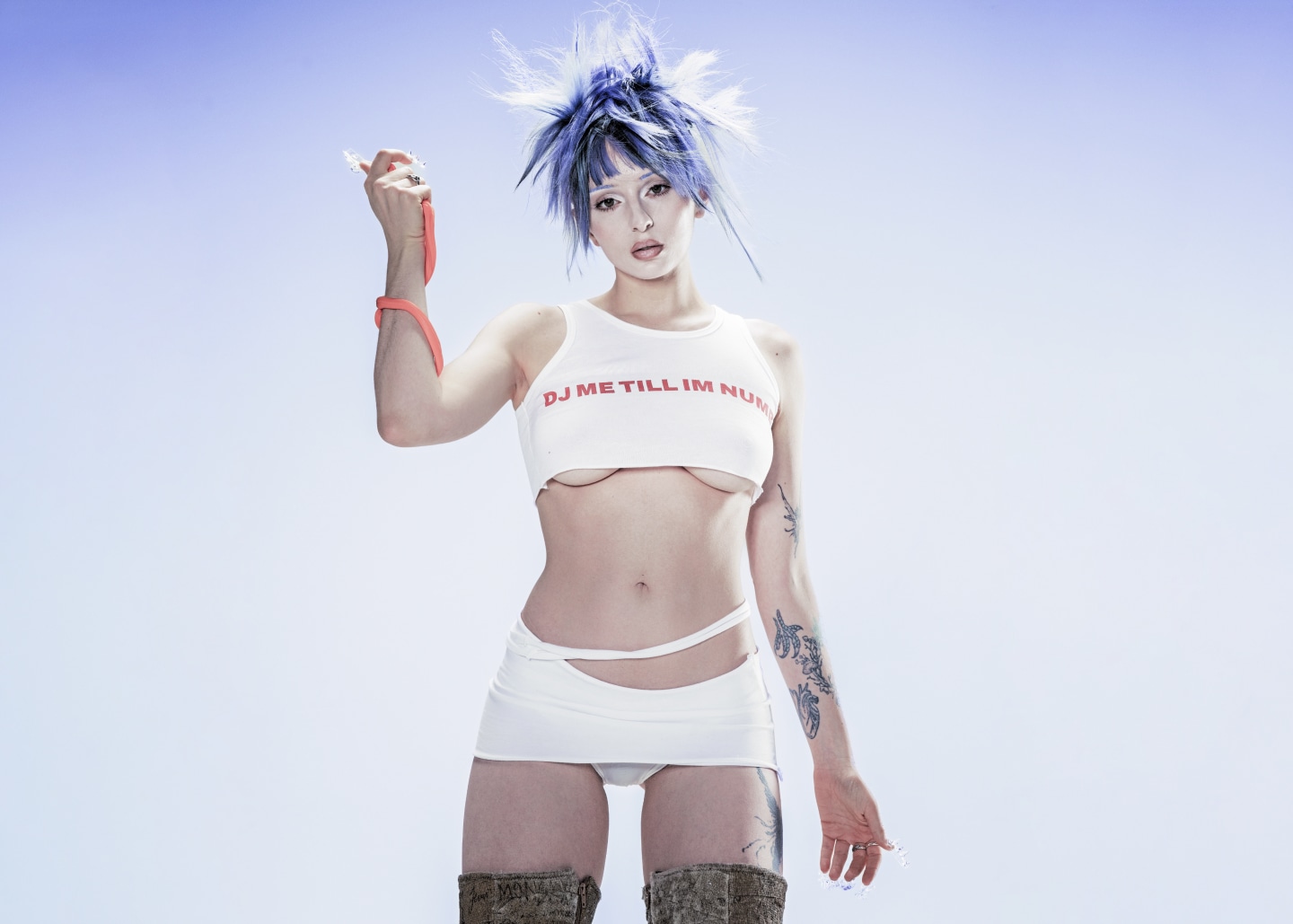
Ashnikko. Photo by Vasso Vu

